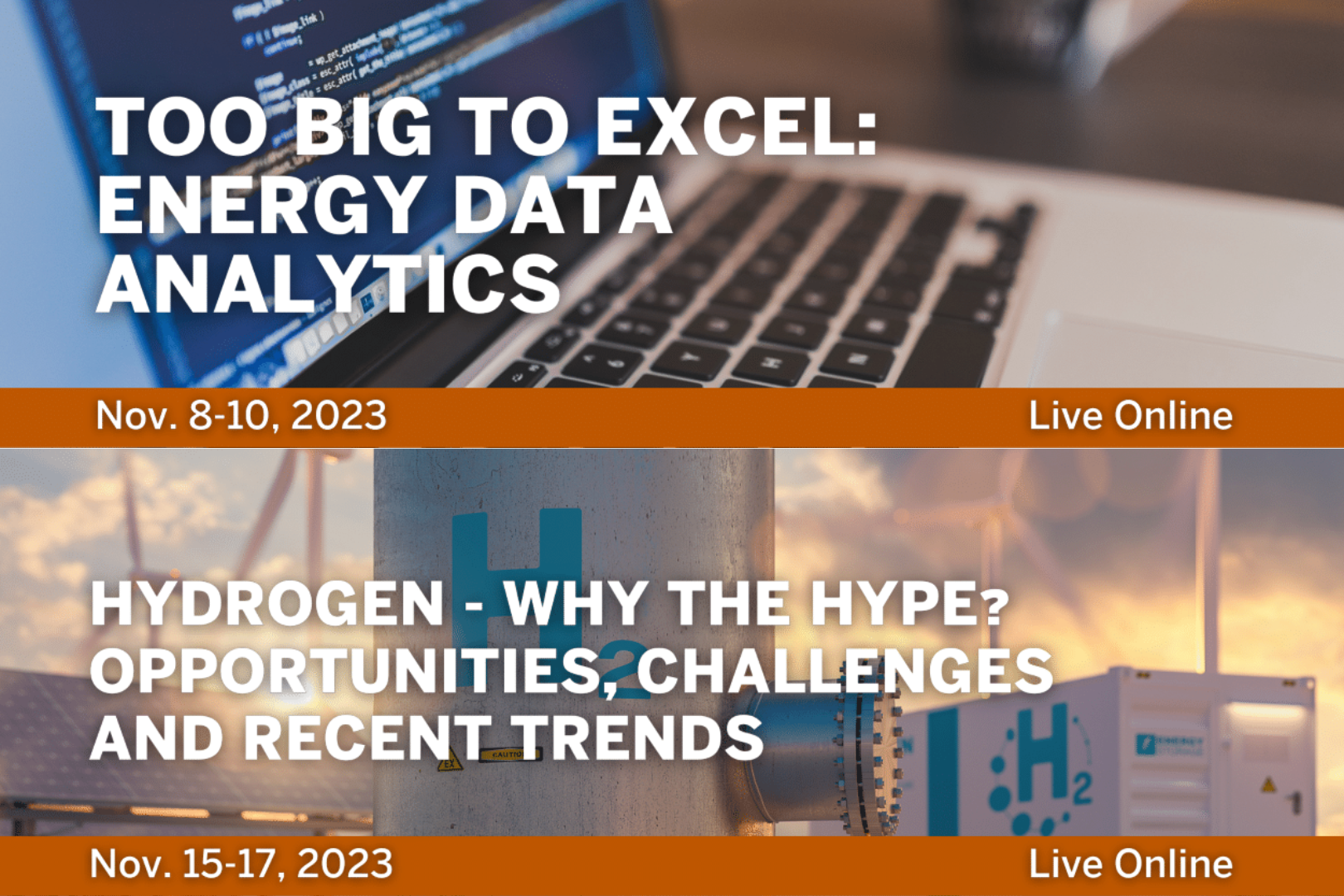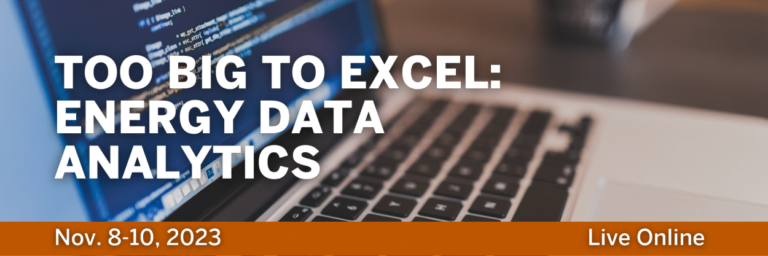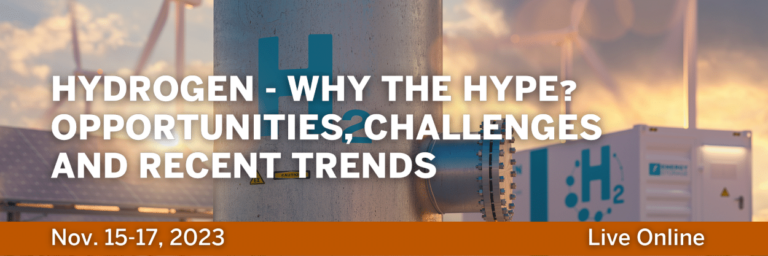Are you ready to have a quick dive into the Hydrogen hype? Are you looking to improve your energy data management skills?
After a successful partnership that allowed 20 members of the UT Austin Portugal’s community in Portugal to attend online advanced training on Hydrogen, the Texas Engineering Executive Education of the Cockrell School of Engineering (TxEEE) and the UT Austin Portugal Program are partnering again to provide researchers/entrepreneurs/industry professionals based in Portugal another opportunity to attend online advanced training on the Energy field.
This time around, there are two online courses available: “Too Big to Excel: Energy Data Analytics” and a new edition of “Hydrogen – Why the hype? Opportunities, Challenges and Recent Trends“. More information about both courses can be found below.
Tuition fees for participants primarily affiliated with Portuguese institutions will not be charged as they will be covered by the UT Austin Portugal Program’s budget at UT Austin.
Registrations are closed.
Registration Form
Seats will be assigned on a first-come-first-serve approach. Participants without primary affiliation to Portuguese institutions will not be accepted into the course.
This is a one-of-a-kind opportunity to expand your knowledge about Hydrogen and its versatility and how to analyze and make sense of large datasets on the Energy field.
Too Big to Excel: Energy Data Analytics
General Information
TxEEE is hosting “Too Big to Excel: Energy Data Analytics” through November 8 to November 10, in three two-hour sessions. This three-day short course is for energy and policy professionals, and business professionals from various industries, seeking an understanding of how to analyze and make sense of large datasets. Course content will include Python basics, using and utilizing Github, how to use Artificial Intelligence resources for developing code, Geospatial analysis using Python and other energy data analytics topics.
Delivered through a combination of lectures, discussion and hands-on practicums, participants will acquire a comprehensive grasp of Python’s capabilities for data analysis. Moreover, they will delve into contemporary engineering approaches in relation to data analysis and coding with a focus on energy datasets.
- Date: November 8 to November 10, 2023 | 4 p.m. – 6 p.m. (Lisbon Time)
- Instructor: Dr. Joshua D. Rhodes
- Platform: Zoom
For more details on this course, visit the official website (for information purposes only).
Agenda (Download it here)
All times in Lisbon Time | Time Zone Converter here
| Wednesday, November 8, 2023 | ||
| Time | Lecture | Topic |
| 4 p.m. – 5 p.m. | 1 | Command line and Linux basics — Understanding how to use a computer without a mouse. |
| 5 p.m. – 6 p.m. | 2 | Setting up coding environments — How to set up a coding environment that can be used to create a recreate code. |
| Thursday, November 9, 2023 | ||
| Time | Lecture | Topic |
| 4 p.m. – 5 p.m. | 3 | Python basics — How Python works, why it is worth learning, and how its basic structure operates. |
| 5 p.m. – 6 p.m. | 4 | Python for data analytics — How to use Python for data analysis, tools, tricks, and workflow examples |
| Friday, November 10, 2023 | ||
| Time | Lecture | Topic |
| 4 p.m. – 5 p.m. | 3 | Geospatial data analysis with Python — Using Python tools for geospatial (map‐based) analyses. |
| 5 p.m. – 6 p.m. | 4 | Using GitHub and closing remarks — Using tools that allow you to share you analysis, or work collaboratively |
Hydrogen – Why the hype? Opportunities, Challenges and Recent Trends
General Information
TxEEE is hosting “Hydrogen – Why the hype? Opportunities, Challenges and Recent Trends” through November 15 to November 17. In this 6-hour course, UT Austin’s top-notch experts will provide an overview of hydrogen use as a climate solution, discuss recent policy and commercial developments related to building a global hydrogen economy and review hydrogen technology research needs, challenges and opportunities.
This course aims to provide a technical baseline of understanding to evaluate the media and policy hype around hydrogen. It includes up-to-date technical, economic and policy information for hydrogen across its supply chain and an introduction of publicly available tools for analyzing hydrogen.
- Date: November 15 to November 17, 2023 | 4 p.m. – 6 p.m. (Lisbon Time)
- Instructor: Emily Beagle, PhD, Michael Webber, PhD and Michael Lewis
- Platform: Zoom
For more details on this course, visit the official website (for information purposes only).
Agenda (Download it here)
All times in Lisbon Time | Time Zone Converter here
| Wednesday, November 15, 2023 | Part One: Introduction, Overview, and Policy Context for Hydrogen | |||
| Time | Lecture | Topic | Primary Instructor |
| 4 p.m. – 5 p.m. | 1 | Hydrogen’s history, current status and potential role in a decarbonized energy future | Dr. Michael Webber |
| 5 p.m. – 6 p.m. | 2 | Recent hydrogen policy and regulatory developments | Dr. Emily Beagle |
| Thursday, November 16, 2023 | Part Two: Deeper Dive on Hydrogen Technology Considerations | |||
| Time | Lecture | Topic | Primary Instructor |
| 4 p.m. – 5 p.m. | 3 | Hydrogen production technologies and safety considerations | Mr. Mike Lewis |
| 5 p.m. – 6 p.m. | 4 | System level considerations for development of hydrogen economy, including hydrogen storage, transportation, and distribution challenges | Dr. Emily Beagle |
| Friday, November 17, 2023 | Part Two: Deeper Dive on Hydrogen Technology Considerations | |||
| Time | Lecture | Topic | Primary Instructor |
| 4 p.m. – 5 p.m. | 3 | Introduction to existing tools for hydrogen project analysis | Mr. Michael Lewis |
| 5 p.m. – 6 p.m. | 4 | Emission abatement potential, risks, and new technology | Dr. Emily Beagle/ Dr.Michael Webber |



